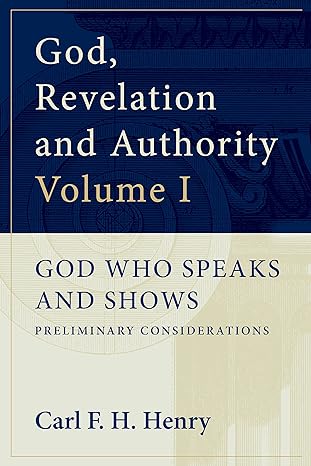A Brief Book Summary from Books At a Glance
by Steve West
About the Author
Carl F. H. Henry was one of the key thinkers and theologians of the evangelical movement in the 20th Century. God, Revelation and Authority is a seminal, multi-volume work of theological and philosophical engagement that has influenced and shaped evangelical thought for decades.
Table of Contents
Introduction to Theology
1. The Crisis of Truth and Word
2. The Clash of Cultural Perspectives
3. Revelation and Myth
4. The Ways of Knowing
5. The Rise and Fall of Logical Positivism
6. The Countercultural Revolt
7. The Jesus Movement and Its Future
8. Secular Man and Ultimate Concerns
9. The Meaning or Myths Man Lives By
10. Theology and Science
Supplementary Note: Science and the Invisible
11. Theology and Philosophy
12. Is Theology a Science
13. The Method and Criteria of Theology (I)
14. The Method and Criteria of Theology (II)
15. Empirical Verification and Christian Theism
16. Man’s Primal Religious Experience
17. A Priori Explanation of Religion
18. The Philosophical Transcendent A Priori (I)
19. The Philosophical Transcendent A Priori (II)
20. The Theological Transcendent A Priori
21. The Philosophic Transcendent (Critical) A Priori
22. Transcendental Religious Apriorism
23. Reflections on Religious Apriorism
24. The “Common Ground” Controversy
Summary
Chapters 1-3
Skepticism and doubt of any authoritative, final word is a hallmark of our culture. Secular media saturate us with audio-visuals designed to lead away from God and fixed moral principles. Media either claims to tell us the way things really are, or denies that absolute truth exists or can be known. Either the Logos of God or the secular spirit of this age will shape our society; we must recover God’s revelation or be overwhelmed with secular messaging. People today get their news of facts and events from media, and do not rely on God’s Word for their interpretation of life. The crisis of Word and truth is everywhere today, and we must understand that it started in Genesis 3. Contemporary people have put their faith in science and technology, and the media steers crises to the sociopolitical world rather than the ethical and spiritual. The very nature of truth and words is being broken down. Even some churches and theologians have challenged language and verbal revelation. Ironically, a torrent of words is used to argue that words aren’t intelligible or communicative. With all of the bad news and misinformation in the world, the good news of the gospel needs to be heard. The church must stand on the Word of God and truth: if truth is lost, nothing can be false, and we will drift to nihilism. We need to know the in-breaking revelation of the transcendent Logos.
All through history, various cultures have understood the world through different methodologies and presuppositions. Against the atomistic naturalism of Democritus, Greek philosophers moved to Idealism, where mind, spirit, and reason reigned. They thought autonomous man could know ultimate truth and goodness, but they failed to find it. The medieval period moved from autonomy to the necessity of revelation in Christ. Biblically, all of the universe is dependent on a personal God, not an immaterial principle. Unfortunately, the medieval thinkers eventually synthesized Greek principles into Christian philosophy, making room for autonomy and inconsistent principles. There was a shift from revelation to human experience, and this led to Descartes and modern philosophy. The transcendent Logos was set aside, and human rationality was made preeminent. Eventually, autonomy led to relativism, but at first, there was an inconsistent attempt to retain certain biblical realities (like goodness, order in the universe, etc.). From Rationalism came the trajectory that led to ultimate reality being seen as irrational. The modern mind is not a mind, but a mood. Truly, the choice is between Christianity and nihilism.
The most critical question in the history of thought is whether every philosophical framework is mythological, or whether one is revelational. Scripture’s authors insisted that God communicated truth in understandable, nonmythological forms. They looked at myth with disdain as pagan and very different than God’s revelation. God is sovereign over history, and history is linear, not cyclical. The gospel must not be cast as ahistorical. Through revelation, transcendent reality is conceptually and historically knowable. Biblical language is not about our subjective, emotional experiences but about God’s objective, literal truth and historical deeds. As a genre, myth cannot communicate literal truth, so reducing Scripture to myth or symbol destroys revelation and the transmission of valid information. Where myth is not accepted as real history, it loses religious significance and becomes irrelevant to people. We cannot avoid asking the question about which of our beliefs are actually true. . . .
[To continue reading this summary, please see below....]The remainder of this article is premium content. Become a member to continue reading.
Already have an account? Sign In
